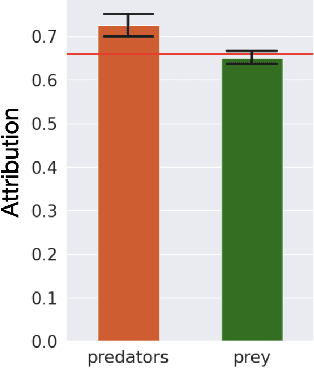Open-endedness induced through a predator-prey scenario using modular robots
Paper and Code
Sep 20, 2023



This work investigates how a predator-prey scenario can induce the emergence of Open-Ended Evolution (OEE). We utilize modular robots of fixed morphologies whose controllers are subject to evolution. In both species, robots can send and receive signals and perceive the relative positions of other robots in the environment. Specifically, we introduce a feature we call a tagging system: it modifies how individuals can perceive each other and is expected to increase behavioral complexity. Our results show the emergence of adaptive strategies, demonstrating the viability of inducing OEE through predator-prey dynamics using modular robots. Such emergence, nevertheless, seemed to depend on conditioning reproduction to an explicit behavioral criterion.
 Add to Chrome
Add to Chrome Add to Firefox
Add to Firefox Add to Edge
Add to Edge